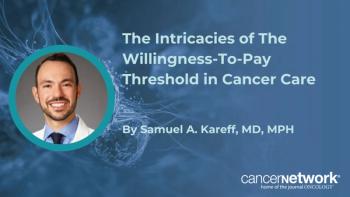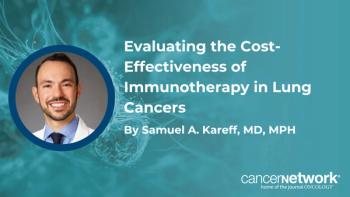
- ONCOLOGY Vol 33 No 11
- Volume 33
- Issue 11
2019 World Conference Of Lung Cancer Round-Up
Five notable abstracts from the 2019 World Conference on Lung Cancer (WCLC).
From September 7-10, 2019, the International Association for the Study of Lung Cancer (IASLC) hosted the 2019 World Conference on Lung Cancer (WCLC) in Barcelona, touted as the biggest gathering of lung cancer researchers and clinicians worldwide. Below are five notable abstracts from the conference.
Concerning Lack of Public Knowledge About Lung Cancer Clinical Trials
A study performed by Lung Cancer Europe (LuCE) to garner insights into clinical trials from a patient perspective found that 50% of Europeans surveyed did not know what cancer clinical trials were and 22% were unaware that cancer clinical trials existed.[1]
“We shared our online survey with lung cancer advocates and patients with lung cancer,” stated lead author AM Baird, on behalf of LuCE in an IASLC press release.[2]
LuCE advocates for the interests of lung cancer patients in Europe and is dedicated to education as well as addressing disparities in detection, diagnosis, and treatment. In this study, researchers interviewed 15 stakeholders in the medical community and surveyed 262 lung cancer patients from 15 European countries.[1]
Only 11% of patients surveyed had participated in a clinical trial, with more than 50% reporting it to be a positive experience. Moreover, 89% found trial information on the Internet, but only 10% reported that they could routinely find the information they required.[1]
“This is critical, as the more information patients obtained, the more willing they were to participate in clinical trials,” wrote the authors in the study abstract. “Overall 80% wanted to find out more about clinical trials, and 75% believed that it would be beneficial for patients to work together with researchers in the clinical trial development process.”[1]
The authors continued, “Key areas identified by this research included difficulties in cross-border access, language barriers, lack of accurate accessible information, lack of awareness by patients and clinicians, and disparities in access across Europe.”[1]
European Lung Cancer Screening Model Bests United States Model
Globally, PLCOm2012 is the best validated and most popular lung cancer risk prediction model; it calls for CT screening in patients with a 6-year lung cancer risk of ≥ 1.5%. Although this model has demonstrated efficacy, it runs counter to recommendations of the United States Preventive Services Task Force (USPSTF) and the Centers for Medicare and Medicaid Services which recommend screening in those with 30 or more pack-years, those who smoked within the past 15 years, and patients age 55 to around 80 years.[3]
“Our analysis of ILST (International Lung Screening Trial) data indicates that classification accuracy of lung cancer screening outcomes supports the PLCOm2012 criteria over the USPSTF criteria,” stated principal investigator, Stephen Lam, MD, University of British Columbia, Vancouver, in an IASLC press release.[4]
The ILST trial is enrolling participants who meet criteria per USPSTF or PLCOm2012. Patients receive two annual screening tests, and patient outcomes are followed for 6 years.[3]
“Many studies indicate that using accurate risk prediction models is superior for selecting individuals for screening, but these findings are based on retrospective analyses. The ILST was implemented to prospectively identify which approach is superior,” wrote the authors.[3]
Overall, 110 of 5013 patients screened had lung cancer, with 99% of cancers discovered per PLCOm2012 criteria compared with 77% per USPSTF criteria. Furthermore, 21.8% of cancers were discovered solely per PLCOm2012 whereas only 0.9% was discovered solely using USPSTF guidelines.[4]
“Our analysis of ILST data indicates that classification accuracy of lung cancer screening outcomes supports the PLCOm2012 criteria over the USPSTF criteria,” concluded Dr Lam.[4]
KEYNOTE-021: Tumor Mutational Burden With or Without Pembrolizumab
According to the results of an exploratory study in first-line treatment for metastatic non-squamous non-small cell lung cancer (NSCLC), tumor mutational burden (TMB) was not related to the efficacy of pembrolizumab plus carboplatin and pemetrexed or carboplatin and pemetrexed alone. TMB was not related to PD-L1 expression.[5]
“KEYNOTE-021 cohort C was the first study to show antitumor activity for pembrolizumab plus platinum-based chemotherapy in previously untreated advanced nonsquamous NSCLC; the combination significantly improved efficacy vs platinum-based chemotherapy alone in cohort G. We explored the relationship between TMB and outcomes in KEYNOTE-021 cohorts C and G,” wrote authors, led by Corey Langer, MD, Abramson Cancer Center, University of Pennsylvania, Philadelphia.[5]
Patients in Cohort C were given pembrolizumab plus carboplatin and pemetrexed. Whereas, patients in cohort G were randomly assigned 1:1 to receive either pembrolizumab plus carboplatin and pemetrexed or the chemotherapy component alone. Langer et al. used whole-exome sequencing of tumors, as well as matched normal DNA, to assess TMB.[6]
Data on TMB were available for 70 patients, with initial patient characteristics similar among both cohorts. As a continuous variable, TMB was not related to progression-free survival, overall response rate (ORR), or overall survival (OS) in either arm of the study. Notably, ORR was high in both the TMB low and high subgroups. In the pembrolizumab with chemotherapy arm, the ORR was 60.8% (95% confidence interval [CI], 38.5-80.3) in the 23 patients with high TMB (TMB <175) and 71.4% (95% CI, 47.8-88.7) in the 21 patients with low TMB (TMB ≥175). No association between TMB and tissue polypeptide-specific antigen was observed (r=0.12, P = .34).[5]
“Sample size is a limitation of this study; exploration in larger datasets is required to understand any differential efficacy of pembrolizumab plus chemotherapy vs chemotherapy alone based on TMB status,” concluded the researchers.[5]
Autoantibody Test Followed by CT Decreases Diagnosis of Late-Stage Lung Cancer and May Reduce Mortality
The novel EarlyCDT-Lung Test plus CT imaging in a Scottish cohort of patients at risk for lung cancer led to a decrease in the diagnosis of late-stage lung cancer and could drop mortality secondary to the disease.[7]
The EarlyCDT-Lung Test is a new autoantibody diagnostic test that stratifies patients according to their risk of developing lung cancer. With a specificity of 90%, it catches 41% of lung cancers compared with CT scanning that only identifies 67% of lung cancers, with a specificity of about 49%.[7]
“The study was not powered to detect a difference in mortality, however there was a non-significant trend suggesting fewer deaths in the intervention arm compared to the control (87 vs 108 respectively). Similar results were noted relating to lung cancer-specific mortality (17 vs 24),” said Sullivan, according to an IASLC press release.[7]
In this randomized controlled trial, the team examined whether EarlyCDT-Lung Test followed by x-ray and CT could reduce the frequency of advanced lung cancer or unclassified presentation in 12,208 high-risk patients. Patients who tested positive per the EarlyCDT-Lung Test were offered chest-x ray and then non-contrast thoracic CT. If the CT was within normal limits, follow-up CTs were available to patients for a period of 24 months. Patients with lesions were followed up by the investigators or sent for referrals and clinical treatment.[8]
Overall, 9.8% of patients in the experimental group had positive EarlyCDT results, with 3.4% diagnosed with lung cancer during the 2-year study period. Furthermore, 127 lung cancer cases were identified, with 56 cases the experimental group and 71 cases in the control group.[8]
Mutations Associated with Response to Immunotherapy: MYSTIC Trial
In patients with metastatic NSCLC, investigators assessed the relationship between STK11, KEAP1, and ARID1A mutations and response to immunotherapy.[9,10]
“The STK11 and KEAP1 mutations … influence outcomes and need to be factored into our analysis of TMB and other outcomes of lung cancer,” said presenter Naiyer A. Rizvi, MD, Director of Thoracic Oncology, Division of Hematology/Oncology, Columbia University Medical Center, New York. “STK11 and KEAP1 are sort of bad actors in terms of lung cancer outcomes [as supported by current knowledge].”[11]
The phase III MYSTIC trial compared durvalumab monotherapy or durvalumab/tremelimumab vs chemotherapy as first-line treatment in patients with epidermal growth-factor receptor and anaplastic lymphoma kinase wild-type locally advanced or metastatic NSCLC. During further analysis, a subset of patients with high TMB were identified via plasma assay using a 20 mutation/megabase threshold.
Participants harboring STK11 or KEAP1 mutations had lower median OS in all experimental groups. In those with ARID1A mutations who received durvalumab/tremelimumab, the investigators saw survival benefits.[9,10].
FIVE KEY REFERENCES
1. Baird AM, Villalon D, Aquaron A, et al. Challenges in lung cancer clinical trials: a European perspective. Program and abstracts of the International Association for the Study of Lung Cancer 20th World Conference on Lung Cancer. September 7-10, 2019. Barcelona, Spain. Abstract MA24.01.
2. Martin C, Bunn B. International Association for the Study of Lung Cancer. Europeans face significant challenges to participate in lung cancer clinical trials. (press release) Available at:
3. Lam S, Myers R, Ruparel M, et al. Lung cancer screenee selection by USPSTF versus PLCOm2012 criteria – interim ILST findings. Program and abstracts of the International Association for the Study of Lung Cancer 20th World Conference on Lung Cancer. September 7-10, 2019. Barcelona, Spain. Abstract PL02.02
5. Langer CJ, Gadgeel S, Borghaei H, et al. KEYNOTE-021: TMB and outcomes for carboplatin and pemetrexed with or without pembrolizumab for nonsquamous NSCLC. Program and abstracts of the International Association for the Study of Lung Cancer 20th World Conference on Lung Cancer. September 7-10, 2019. Barcelona, Spain. Abstract OA04.05.
10. Rizvi NA, Cho BC, Reinmuth N, et al. Mutations associated with sensitivity or resistance to immunotherapy in mNSCLC: analysis from the MYSTIC trial. Program and abstracts of the International Association for the Study of Lung Cancer 20th World Conference on Lung Cancer. September 7-10, 2019. Barcelona, Spain. Abstract OA04.07
References:
1. Baird AM, Villalon D, Aquaron A, et al. Challenges in lung cancer clinical trials: a European perspective. Program and abstracts of the International Association for the Study of Lung Cancer 20th World Conference on Lung Cancer. September 7-10, 2019. Barcelona, Spain. Abstract MA24.01.
2. Martin C, Bunn B. International Association for the Study of Lung Cancer. Europeans face significant challenges to participate in lung cancer clinical trials. (press release) Available at:
3. Lam S, Myers R, Ruparel M, et al. Lung cancer screenee selection by USPSTF versus PLCOm2012 criteria – interim ILST findings. Program and abstracts of the International Association for the Study of Lung Cancer 20th World Conference on Lung Cancer. September 7-10, 2019. Barcelona, Spain. Abstract PL02.02.
4. Martin C, Bunn B. International Association for the Study of Lung Cancer. Lung cancer screening model favored in Europe detects more cancers than one preferred in the United States. (press release) Available at:
5. Langer CJ, Gadgeel S, Borghaei H, et al. KEYNOTE-021: TMB and outcomes for carboplatin and pemetrexed with or without pembrolizumab for nonsquamous NSCLC. Program and abstracts of the International Association for the Study of Lung Cancer 20th World Conference on Lung Cancer. September 7-10, 2019. Barcelona, Spain. Abstract OA04.05.
6. Martin C, Bunn B. International Association for the Study of Lung Cancer. New KEYNOTE 021 data shows no association with tumor mutational burden. (press release) Available at:
7. Martin C, Bunn B. International Association for the Study of Lung Cancer. Scottish study demonstrates that autoantibody test followed by CT imaging may reduce lung cancer mortality. (press release) Available at:
8. Sullivan F, Schembri S. Early Detection of Cancer of the Lung Scotland (ECLS): trial results. Program and abstracts of the International Association for the Study of Lung Cancer 20th World Conference on Lung Cancer. September 7-10, 2019. Barcelona, Spain. Abstract PL02.03.
9. Martin C. Mutations associated with sensitivity or resistance to immunotherapy in mNSCLC: analysis from the MYSTIC trial. (press release). International Association for the Study of Lung Cancer. Available at:
10. Rizvi NA, Cho BC, Reinmuth N, et al. Mutations associated with sensitivity or resistance to immunotherapy in mNSCLC: analysis from the MYSTIC trial. Program and abstracts of the International Association for the Study of Lung Cancer 20th World Conference on Lung Cancer. September 7-10, 2019. Barcelona, Spain. Abstract OA04.07.
11. International Association for the Study of Lung Cancer 20th World Conference on Lung Cancer. Press conference. September 8, 2019.
Articles in this issue
over 6 years ago
Esmo Congress 2019: Focus on Breast Cancerover 6 years ago
What Are the Most Common Esophageal Metastasesover 6 years ago
Burnout in OncologyNewsletter
Stay up to date on recent advances in the multidisciplinary approach to cancer.
Related Content




Evaluating the Cost-Effectiveness of Immunotherapy in Lung Cancers











































